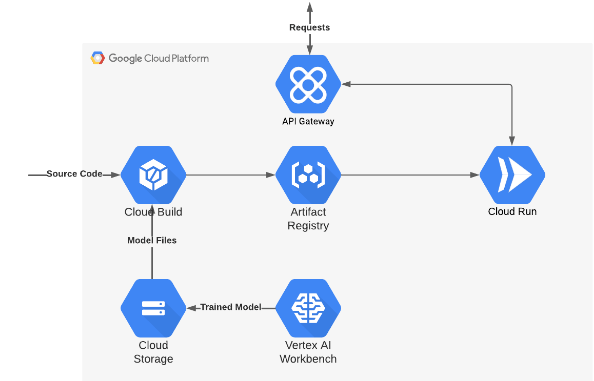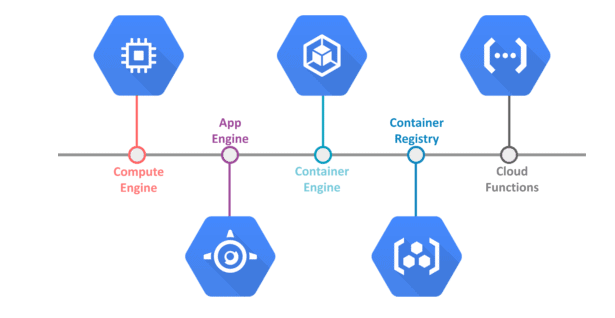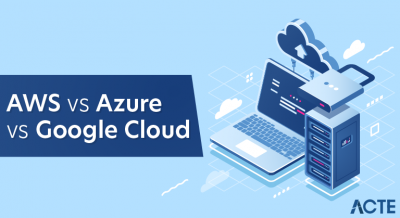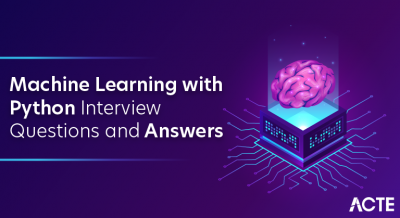
- Introduction to Google Cloud Machine Learning
- Key Features of Google Cloud ML
- How Google Cloud ML Works
- Benefits of Using Google Cloud ML
- Google Cloud ML vs. Other Cloud ML Platforms
- Use Cases of Google Cloud ML
- Security and Compliance in Google Cloud ML
- Industry Adoption and Case Studies
- Google Cloud ML Best Practices
- Future of Google Cloud ML
- Conclusion
Introduction to Google Cloud Machine Learning
Google Cloud Machine Learning (ML) is a powerful suite of AI-driven tools and services that enables businesses to build, train, and deploy machine learning models at scale. With access to both pre-trained models and the ability to develop custom AI models, Google Cloud ML helps organizations implement artificial intelligence to enhance data-driven decision-making and improve efficiency. Whether you’re an enterprise aiming to automate complex processes or a developer looking to integrate machine learning into your applications, Google Cloud ML offers flexible, scalable solutions tailored to meet diverse business needs. The platform supports a wide array of industries, including healthcare, finance, and e-commerce, empowering companies to use AI to drive innovation and gain a competitive edge. It leverages Google’s robust cloud infrastructure, providing the foundation for AI-powered solutions in the Cloud Computing Course. Google Cloud ML’s extensive tools cater to both technical and non-technical users, making it accessible for a broad range of organizations. As businesses increasingly adopt AI technologies, Google Cloud ML is positioned as a leading choice for leveraging machine learning at scale to deliver impactful results.
Key Features of Google Cloud ML
- AutoML: Enables businesses to develop AI models with minimal coding.
- Vertex AI: Unified platform for building, training, and deploying ML models.
- BigQuery ML: Perform machine learning within BigQuery using SQL queries.
- Pre-trained APIs: Ready-to-use models for vision, speech, language, and translation.
- TensorFlow and TPUs: Optimized machine learning performance with Tensor Processing Units.
- Explainable AI: Provides insights into model predictions and decision-making processes.
- Data Labeling Services: Helps organizations annotate datasets for AI training.
- Federated Learning: Enhances privacy-preserving machine learning by training models on decentralized data.
- Scalability: Handles large datasets with high-performance computing resources.
- Ease of Use: Pre-built APIs and AutoML simplify machine learning development.
- Integration with Google Services: Seamlessly connects with BigQuery, Dataflow, and Kubernetes.
- Advanced AI Research: Leverages TensorFlow and JAX for deep learning.
- Cost Efficiency: Pay-as-you-go pricing with optimized ML workflows in Understanding Docker.
- Security and Compliance: Enterprise-grade security with data encryption and IAM roles.
- Faster Time to Market: Pre-trained models and AutoML reduce development cycles.
- Hybrid and Multi-Cloud Support: Deploy ML models across Google Cloud, on-premises, or hybrid environments.
- Google Cloud ML: Excels in AI research, deep learning, and large-scale data analytics.
- AWS Machine Learning: Offers strong enterprise integrations and AI-powered business intelligence.
- Azure Machine Learning: Provides seamless Microsoft ecosystem integration and model interpretability.
- Strengths of Google Cloud ML: Best suited for businesses leveraging AI-driven insights, automation, and real-time analytics.
- Customization and Flexibility: Google Cloud ML offers a more modular and customizable AI infrastructure than AWS and Azure.
- Fraud Detection: Identifies anomalies in financial transactions using AI models.
- Customer Personalization: Recommender systems for e-commerce and media platforms.
- Healthcare AI: Predictive analytics and diagnostic support in medical research.
- Automated Chatbots: AI-driven virtual assistants for customer support in the Cloud Computing Course.
- Image and Video Analysis: Object recognition, facial analysis, and content moderation.
- Speech and Language Processing: Text-to-speech, translation, and sentiment analysis.
- Predictive Maintenance: Uses AI to forecast equipment failures in manufacturing.
- Self-Driving Technology: Supports autonomous vehicles with AI-driven perception models.
- Retail: Walmart uses Google Cloud ML for personalized recommendations and inventory management.
- Finance: HSBC leverages AI-powered fraud detection models to secure transactions.
- Healthcare: Mayo Clinic applies AI for predictive diagnostics and medical research.
- Media and Entertainment: Spotify enhances user experience with AI-driven content recommendations in a DevOps Engineer Resume.
- Optimize Data Quality: Ensure labeled datasets are clean and balanced for better AI performance.
- Monitor Model Performance: Use Explainable AI tools to analyze and refine predictions.
- Implement CI/CD for ML: Automate model training and deployment with MLOps best practices.
- Use Cost-Effective Compute Resources: Optimize training workloads using preemptible TPUs.
- Enhance Security and Privacy: Apply differential privacy techniques for sensitive AI applications.

To Earn Your Cloud Computing Certification, Gain Insights From Leading Cloud Computing Experts And Advance Your Career With ACTE’s Cloud Computing Online Course Today!
How Google Cloud ML Works
Google Cloud ML leverages Google’s robust cloud infrastructure to build, train, and deploy machine learning models efficiently. With Vertex AI, developers can manage the entire machine learning lifecycle, from data preprocessing to model evaluation, all within a unified platform. Vertex AI simplifies the process, offering a range of tools to streamline model development, including automated machine learning (AutoML) capabilities, which allow users with little to no coding experience to build custom models tailored to specific use cases in Practices and Tools in DevOps. Additionally, BigQuery ML enables analysts to integrate machine learning directly into their SQL-based workflows, empowering data professionals to perform predictive analysis without leaving their familiar environments. Google Cloud ML services are versatile, supporting both structured and unstructured data, making them suitable for a wide range of AI-driven applications. Whether processing text, images, or large datasets, the platform provides the tools necessary for seamless data integration. Furthermore, Google Cloud ML offers serverless infrastructure for deploying models, ensuring scalability, cost efficiency, and high performance for real-world applications. These capabilities make Google Cloud ML a powerful choice for businesses seeking to implement advanced AI solutions at scale.
Benefits of Using Google Cloud ML
Google Cloud ML vs. Other Cloud ML Platforms

Interested in Obtaining Your Cloud Computing Certificate? View The Cloud Computing Online Course Offered By ACTE Right Now!
Use Cases of Google Cloud ML
Security and Compliance in Google Cloud ML
Google Cloud ML offers comprehensive security features designed to protect AI-driven solutions. Key features include Identity and Access Management (IAM), which controls user access to resources, and encryption to secure data both in transit and at rest. Google Cloud’s compliance with regulations like GDPR, HIPAA, and SOC 2 ensures that businesses can implement AI technologies while meeting stringent regulatory requirements in Hybrid Cloud & Hypervisors for Scalability. For enhanced security, AI models can be deployed in private networks, with role-based access control (RBAC) further restricting access based on user roles. Additionally, Google provides specialized tools to detect and prevent adversarial attacks and model manipulation, ensuring the integrity of AI models. These security measures make Google Cloud ML a robust platform for enterprises seeking to build and deploy AI solutions safely while maintaining compliance with industry standards. With these protections, businesses can confidently leverage the power of AI without compromising security.
Gain Your Master’s Certification in Cloud Computing by Enrolling in Our Cloud Computing Masters Course.
Industry Adoption and Case Studies
Several leading organizations have adopted Google Cloud ML to drive innovation:
Google Cloud ML Best Practices
Future of Google Cloud ML
Google Cloud Machine Learning (ML) is poised for significant advancements in the coming years, particularly in areas like AI automation, responsible AI, and edge computing. As AI technologies evolve, Google is expected to push the boundaries of automation, offering more sophisticated tools to streamline machine learning workflows and reduce the need for manual intervention. Enhanced generative AI models will allow businesses to create more powerful and versatile AI-driven solutions, while tighter integration with Google Workspace will enable seamless collaboration and workflow optimization for organizations in AWS Blockchain Services for Secure Transactions. With the growing focus on responsible AI, future developments will likely include improved transparency tools, such as better explainable AI frameworks and more robust bias detection mechanisms. These features will help organizations ensure their AI models are ethical and aligned with regulatory requirements. As demand for ethical AI grows, Google will enhance its offerings in this space, ensuring that businesses can use AI in a responsible, transparent, and fair manner. Moreover, Google’s investments in federated learning and on-device AI will provide opportunities for privacy-preserving machine learning models, making it easier for businesses to implement AI solutions without compromising user privacy. As industries continue to adopt AI-driven strategies, Google Cloud ML will be at the forefront of shaping the future of AI applications, driving innovation and ensuring ethical standards.
Preparing for a Cloud Computing Job Interview? Check Out Our Blog on Cloud Computing Interview Questions & Answer
Conclusion
Google Cloud Machine Learning (ML) provides businesses with a comprehensive suite of AI solutions designed to seamlessly integrate artificial intelligence into their operations. Its scalable infrastructure, advanced deep learning capabilities, and tight integration with other Google Cloud services make it an ideal choice for organizations looking to drive AI-driven transformation. Whether it’s processing vast amounts of data or building sophisticated AI models, Google Cloud ML delivers the tools necessary for businesses to harness the full power of machine learning in the Cloud Computing Course. As AI technology continues to evolve, Google Cloud ML is committed to staying at the forefront of innovation, constantly refining its offerings to meet the ever-changing needs of businesses. By adopting Google Cloud ML, companies can access cutting-edge AI models, automate processes, and leverage advanced analytics for actionable insights. This empowers businesses to make data-driven decisions, improve operational efficiency, and foster growth in the digital era. With its robust capabilities, Google Cloud ML will continue to be a pivotal platform for organizations aiming to unlock the full potential of machine learning and artificial intelligence in driving business success.



